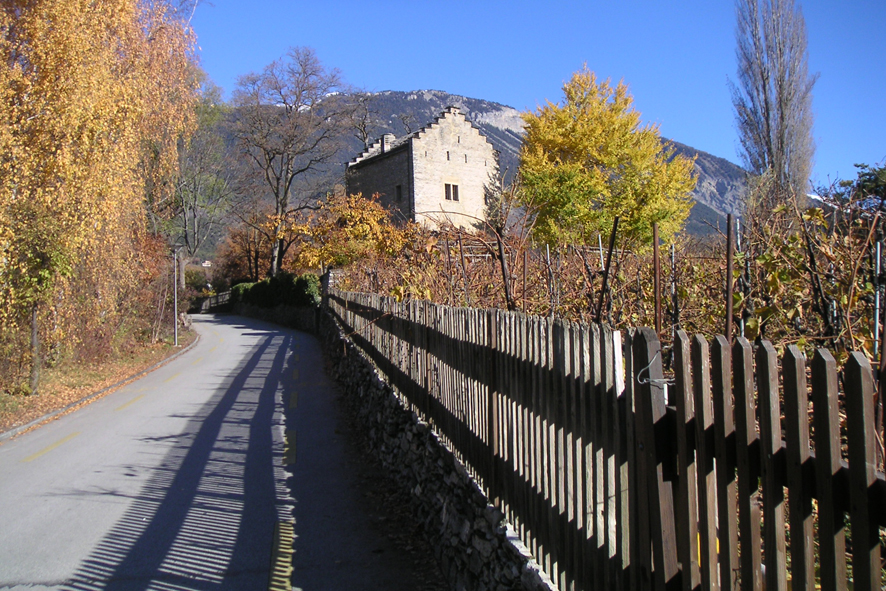Château De Muzot on:
[Wikipedia]
[Google]
[Amazon]
 Château de Muzot (also known as Maison Muzot or Muzot Castle) is a 13th-century fortified manor house located near Veyras in
Château de Muzot (also known as Maison Muzot or Muzot Castle) is a 13th-century fortified manor house located near Veyras in
 Château de Muzot (also known as Maison Muzot or Muzot Castle) is a 13th-century fortified manor house located near Veyras in
Château de Muzot (also known as Maison Muzot or Muzot Castle) is a 13th-century fortified manor house located near Veyras in Switzerland
Switzerland, officially the Swiss Confederation, is a landlocked country located in west-central Europe. It is bordered by Italy to the south, France to the west, Germany to the north, and Austria and Liechtenstein to the east. Switzerland ...
's Rhone Valley.
In 1921, it was purchased by Swiss merchant and arts patron Werner Reinhart who then invited Bohemian-Austrian poet Rainer Maria Rilke
René Karl Wilhelm Johann Josef Maria Rilke (4 December 1875 – 29 December 1926), known as Rainer Maria Rilke, was an Austrian poet and novelist. Acclaimed as an Idiosyncrasy, idiosyncratic and expressive poet, he is widely recognized as ...
(1875–1926) to live there rent-free. It was at Muzot, during a few weeks in February 1922, that Rilke after a long silence caused by severe depression finally completed the ''Duino Elegies
The ''Duino Elegies'' () are a collection of ten elegy, elegies written by the Bohemian-Austrians, Austrian poet Rainer Maria Rilke. He was then "widely recognized as one of the most lyrically intense German-language poets", and began the eleg ...
'' and wrote the entire ''Sonnets to Orpheus
The ''Sonnets to Orpheus'' () are a cycle of 55 sonnets written in 1922 by the Bohemian- Austrian poet Rainer Maria Rilke (1875–1926). It was first published the following year. Rilke, who is "widely recognized as one of the most lyrically int ...
'' (both published in 1923).
Rilke: ''Duino Elegies'' and ''Sonnets to Orpheus''
From 1921 to 1926, Muzot was the home of Bohemian-Austrian poetRainer Maria Rilke
René Karl Wilhelm Johann Josef Maria Rilke (4 December 1875 – 29 December 1926), known as Rainer Maria Rilke, was an Austrian poet and novelist. Acclaimed as an Idiosyncrasy, idiosyncratic and expressive poet, he is widely recognized as ...
(1875–1926). Here, after ten years of work and delays, in February 1922 Rilke finished work on the ''Duino Elegies
The ''Duino Elegies'' () are a collection of ten elegy, elegies written by the Bohemian-Austrians, Austrian poet Rainer Maria Rilke. He was then "widely recognized as one of the most lyrically intense German-language poets", and began the eleg ...
'', a collection of ten long poems concerning deeply mystical and philosophical themes. Muzot appears in a reference within the poem cycle ''Sonnets from China'' (1936) by British poet W.H. Auden (1907–1973) who was inspired by Rilke.
The reference here to stroking "that little tower" is Muzot, and is derived from a series of letters written while Rilke was completing the ''Elegies'' including a letter he wrote to his current lover Baladine Klossowska, and one to his former lover,Tonight in China let me think of one Who through ten years of silence worked and waited, Until in Muzot all his powers spoke, And everything was given once for all. And with the gratitude of the Completed He went out in the winter night to stroke That little tower like a great old animal
Lou Andreas-Salomé
Lou Andreas-Salomé (born either Louise von Salomé or Luíza Gustavovna Salomé or Lioulia von Salomé, ; 12 February 1861 – 5 February 1937) was a Russian-born psychoanalyst and a well-traveled author, narrator, and essayist from a French Hu ...
. In the letter to Andreas-Salomé, he writes "I went out and stroked the little Muzot, which protected it and me and finally granted it, like a large old animal.".Rilke to Lou Andreas-Salomé (11 February 1922) in Rilke, Rainer Maria and Andreas-Salomé, Lou. Briefwechsel (Insel, 1952), 464.
References
{{DEFAULTSORT:Muzot, Chateau de Rainer Maria Rilke Castles in the canton of Valais Buildings and structures completed in the 13th century